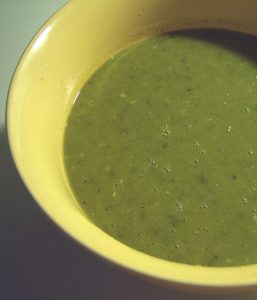Is milk healthy? Split pea soup, without it
By Joel MacKenzie, Staff Writer
Think you don’t have what it takes to eat well and affordably? You are wrong, friend! Look to College Cooking for recipes, ideas, and healthy eating information to help post-secondary students create healthy, unique, satisfying food for cheap
It’s hard to find an unbiased source of information on milk. It seems to either come from companies selling products, or from groups opposing it fundamentally, who may prefer scare-tactics over facts. Is it really healthy?
Some argue that milk is healthy. It contains beneficial minerals and complete proteins. Some even go as far as saying that milk, especially raw milk, is a cure-all that can heal many common ailments. Several books have been published on the subject, and diets have been designed with this in mind.
But the human consumption of milk is essentially unusual. Milk is produced for baby animals. It contains the essential nutrients for their growth, including high amounts of hormones; cows’ milk, for example, is very high in estrogen, a female growth hormone. Modern cows’ milk actually contains more estrogen, too. The unnaturally long state of pregnancy that dairy cows are kept in to produce estrogen, increases it. Some speculate that a very high amount of estrogen in the diet causes severe problems in people, including weight gain, cancers in women, and complications to men’s reproductive health.
These oddities may explain why it causes—or is believed to cause—so many problems. Many can’t digest milk, because after infancy, animals naturally lose the enzyme lactase, which digests lactose, a sugar in milk, unless it is continually consumed after infancy. Some studies have also found links between milk and eczema, sinus problems, migraine headaches, and joint pain, among other problems.
Modern, mass-produced milk is also not the same milk that was available to our ancestors. Modern dairy cows are often fed growth hormones (luckily, not in Canada) and antibiotics to produce the amount of milk that they do. These can be passed through the animal to the consumer. And cows’ diets have changed to be more cost efficient to the farmer. The cows are fed corn and other food that they are not used to digesting, leading to unhealthier cows and less nutritious milk.
Personally, I have found that, of all the foods that I have removed from my diet, removing milk has made me feel the healthiest and most comfortable. Of course, everyone’s body is different, and part of being healthy is learning to listen to and respect your own body.
Split Pea Soup
Is there any food more comforting or easy to make than split pea soup?
This week’s recipe comes from Jessica Verma from cleangreensimple.com. Check out the website for even more awesome breakfast, lunch, dinner, and dessert recipes.
Ingredients:
2 cups dried split peas
2 carrots, diced
2 celery stalks, diced
1 large onion, diced
3-4 cloves garlic, minced
5 cups water
1/4 tsp dried thyme
1/4 tsp dried oregano
1 tsp salt
Pinch black pepper
Pinch red pepper flakes (optional)
One chipotle chili in adobo sauce, diced (optional)
Directions:
Combine all ingredients in a large pot and boil over medium heat for about two hours, or until all the ingredients have broken down and the soup has a uniform consistency. Take a ladle to it. Enjoy.

